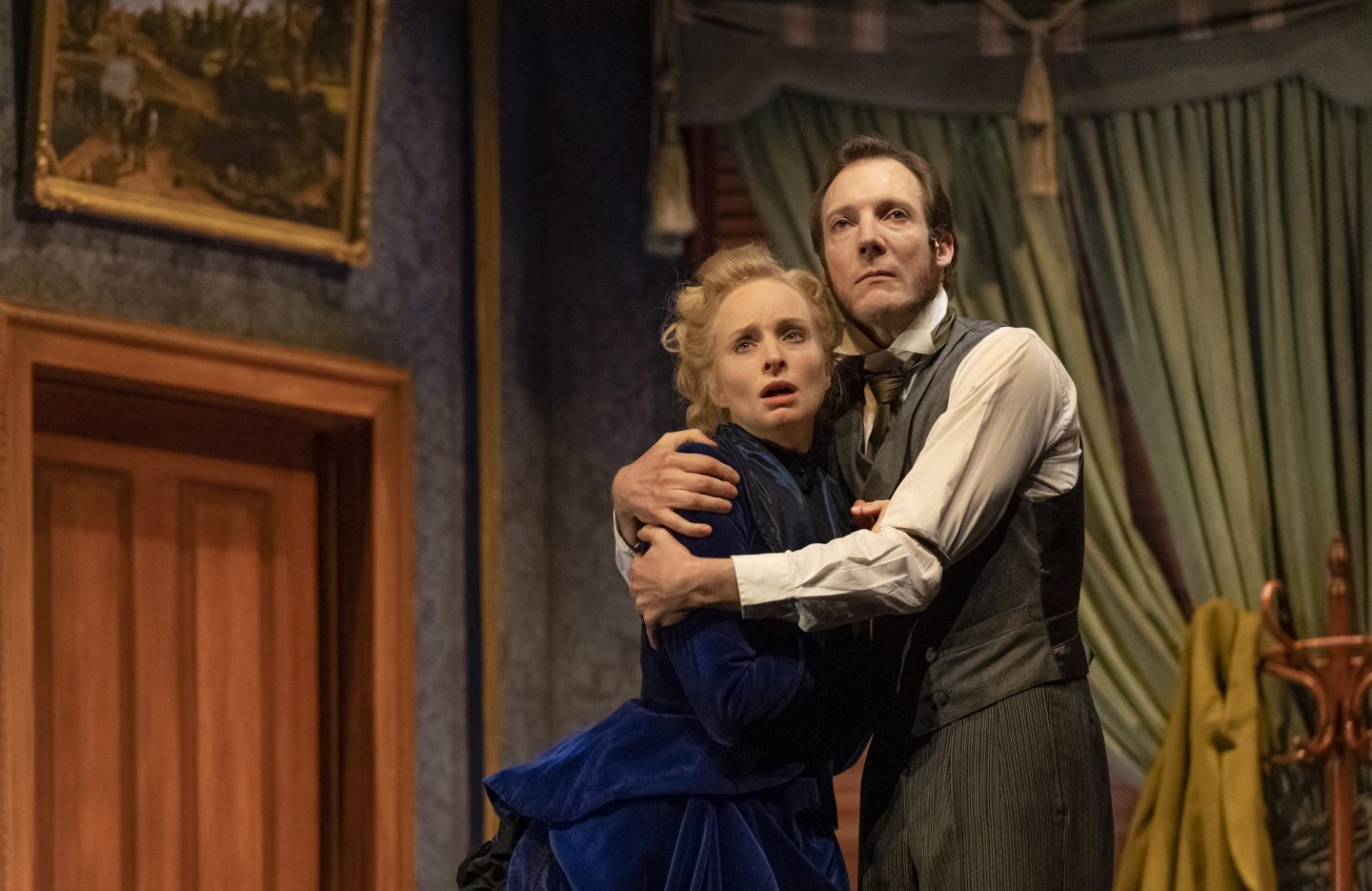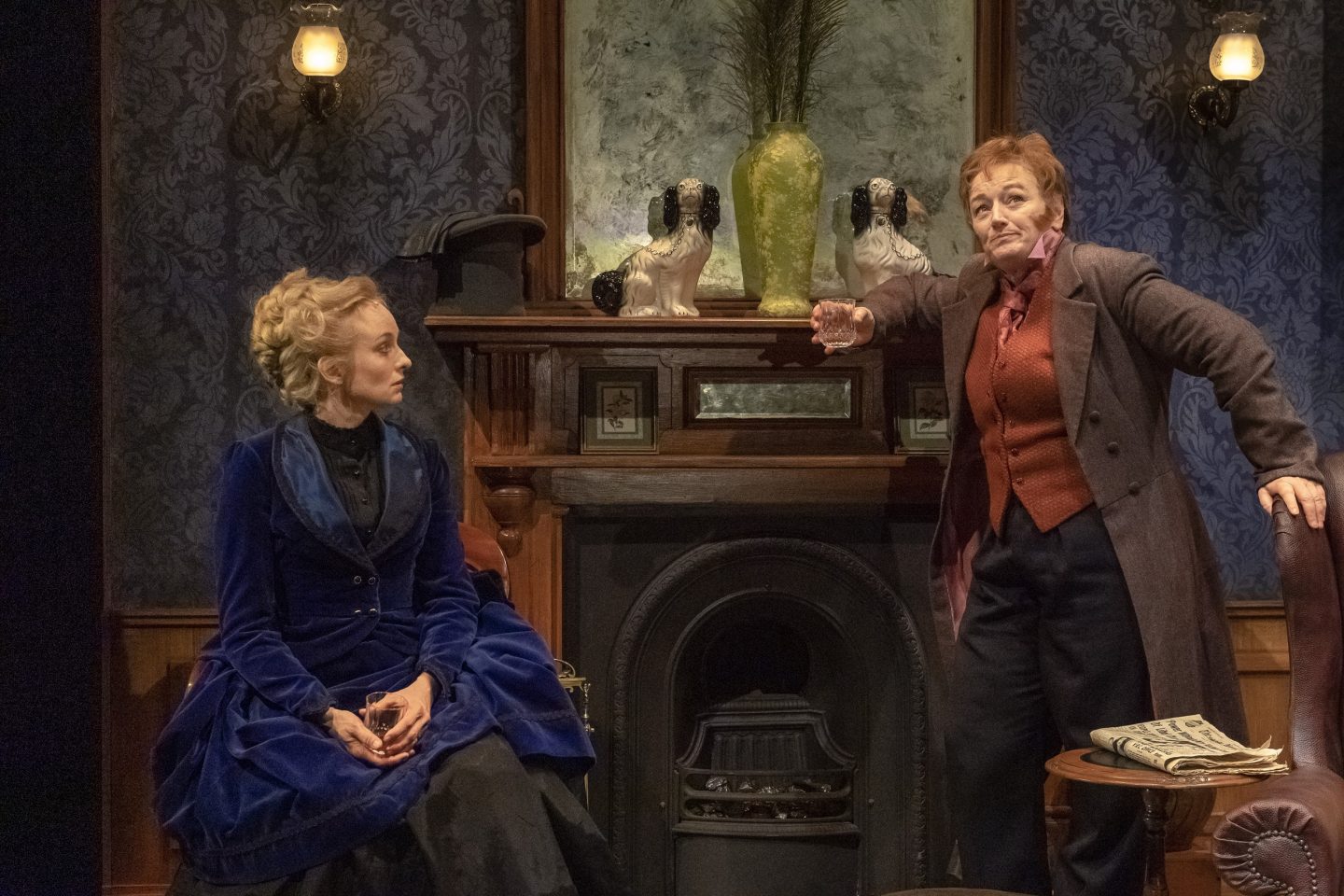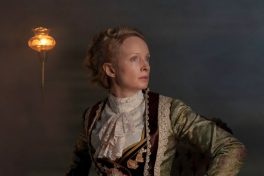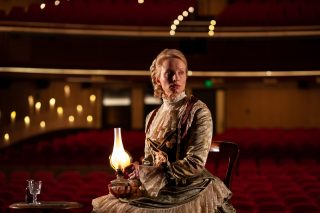
Walter Marsh
Walter is a writer and editor living on Kaurna Country.

State Theatre Company South Australia returns to the stage with an 80-year-old costume drama about coercive control that’s both ahead of its time, and slightly behind ours.
Perhaps it’s fitting that for South Australia’s first proper night out at the theatre since March, we find ourselves trapped, staring at the walls of a stuffy Victorian home. One suspects that for a not-insignificant portion of the State Theatre’s regular audience, that’s exactly what they’ve been doing for the past six months.
But before the big, new, red curtain of Her Majesty’s Theatre is raised for its first official opening night performance, Eileen Darley saunters onto the stage in male drag in an impression of Victorian-era music hall star Vesta Tilley. She twirls her cane, doffs her cap and sings Following In My Father’s Footsteps, a bawdy music hall parody of masculinity once sung by Tilley.
It’s an unexpected, but oddly appropriate reintroduction to the century-old Her Majesty’s Theatre, first built at the height of music hall’s popularity even if everything but the front façade has been rebuilt. It’s also a clue to director Catherine Fitzgerald’s intentions for this 1938 play.
In Fitzgerald’s hands, Patrick Hamilton’s socially-conscious thriller leans into its modern-day context, in which the campaign of psychological manipulation waged against protagonist Bella Manningham (Ksenja Logos) by her husband Jack (Nathan O’Keefe) has come to describe everything from abusive husbands to lying presidents: gaslighting.
We meet the unhappy couple in the sitting room of their London townhouse, its Victorian décor rendered to stifling effect by set designer Ailsa Paterson – all heavy drapes, busy wallpaper and chairs crowding every step. In their seemingly endless layers of period clothing the cast routinely bump into and reset bits of furniture and set dressing, laying on the comic tension as coats and jackets and hats and collars are peeled off and replaced over and over.
Bella desperately wants to leave the house, but her only interface with the outside world comes via servants – Victorian-era essential workers, perhaps? I’m going to resist any more laboured COVID-19 comparisons, but it is amusing to think of the SA Health officials who probably had to sign off on a scene in which Bella and the two servants Elizabeth (Ellen Freeman) and Nancy (Katherine Sortini) are all forced swear on the same bible by kissing its front cover.

The Manninghams are enjoying a brief moment of what passes for contentment, as a chipper Jack offers to take Bella to the theatre – a reward for her improved behaviour. Things deteriorate when a missing picture prompts a humiliating confrontation. Jack accuses Bella once again ‘playing tricks’, she of course cannot recall any of it, and he cruelly rescinds the theatre invitation. In its place, he reminds her of the standing offer to send her to ‘the madhouse’ if her mental faculties continue to decline.
It’s no spoiler to say that no, she isn’t mad, it’s all her husband’s doing. Exactly how becomes clear when Darley reappears as retired Inspector Rough, as Fitzgerald becomes the latest contemporary director to genderflip the role to skirt around the fact much of the play consists of Rough clueing Bella in to her husband’s deceptions and other, even worse crimes. Um, mansplaining much?
While certainly an of-its-time premise, it’s perhaps not quite the empowering narrative audiences of 2020 might crave, even as the pair piece together the pattern of Jack’s behaviour: the dictating of his wife’s behaviour and movements, the contrived veneer of affability masking deeper cruelty, the medication, the alienation from family and outside networks, the denial of reality, and the looming threat of institutionalisation to force compliance. All of which we now understand as insidious forms of domestic abuse and coercive control.
Despite the darkness, Darley plays Rough with a kind of Sylvestor McCoy broguish eccentricity that brings a surprisingly light, satirical touch to the play even as the Hitchcockian tension ratchets up. It also makes for a tonally split mix of tragedy and comedy, much like its efforts to punch up the play’s eerie prescience and paper over its dated elements.
Whatever insights Hamilton affords, it’s ultimately stitched into the framework of a 1930s thriller; despite O’Keefe’s characterisation of Jack as a kind of smiling manipulator of the why-are-you-being-like-this-when-I’m-so-good-to-you variety, the murderous extent of his true ambition risks turning him into a kind of monstrous, irrationally jewel-obsessed villain.
In this story, the erosion of Bella’s sanity and Jack’s absolute control is part of a wider conspiracy rather than, as is so often the case, the end game. Which leaves one thinking, despite the timeliness of its title, perhaps there are other works that might explore these themes in an even more compelling and nuanced way, without the need for genderflipping and other embellishments.
But perhaps this is unfair; this production of Gaslight arrives in a far different context to when it was first envisioned. Without the State Theatre Company’s broader 2020 program – which included intriguing-sounding works like Ella Hickson’s The Writer – it not only has to meet the pent-up expectations of being perhaps the first major stage show seen in Australia in six whole months, but of solely carrying a broader conversation that has key pieces missing.
It’s certainly liberating to be back in a theatre again, to see real-life actors on a real-life stage, and to laugh, applaud and gasp while surrounded by friends and strangers (albeit with a vacant seat between each of us). But it’s also a bittersweet reminder of just how much remains missing from 2020.
Due to popular demand an extra performance of Gaslight has been added for Saturday 19 September, 2pm


Walter is a writer and editor living on Kaurna Country.
